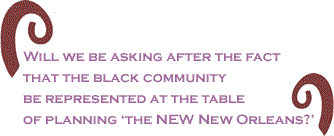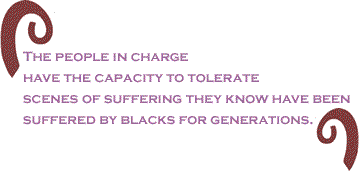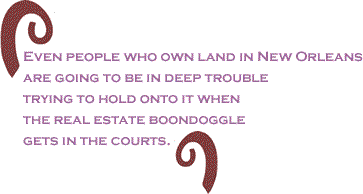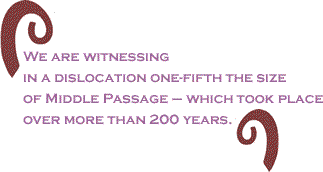
|
|||||||||||||||||||||
|
When I woke up today, the only thought that came to
mind was Reverend Jesse Jackson's indignant cry, "This is the
bottom of the slave ship we are looking at."
African Americans in this crisis are further having
the devastating experience of watching parents suffer and die right
in their faces on sidewalks where people were forced to stand, not
even sit for days. And the people crowded next to them experienced
the same deaths. And like our ancestors, the poor today will have
no access to therapeutic treatment. This is where you just have
to agree with Jesse that the people in charge have the capacity
to tolerate scenes of suffering they know have been suffered by
blacks for generations.
Will Jackson, Rev. Al, Rep. Elijah Cummings, et. al. be asking after the fact, after they've read about development plans in the papers that the black community be represented at the table of planning "the NEW New Orleans?" The cultural heritage of New Orleans, which is so singular, is in serious jeopardy. The perfect mix of forces and cultures was based in a particularly unique feature of the dispersion of Africans during slavery: a disproportionate share of the Yoruba brought here (who were a minority within the groups in Middle Passage) landed in that area. What happened after that in encounters with the French, the Caribbean and the peoples of the States, cannot be replicated. Replacing the architecture with vinyl versions of shotgun and camel back houses will not produce any Buddy Boldens, Jelly Roll Mortons or Louis Armstrongs. As a writer, I myself have used the invaluable records kept there of this unique heritage. Just as one had to worry in the several rounds of the bombing of Baghdad that not only were untold people being killed but some of the oldest treasures of human life, I feel even more concerned that no one will care that thousands have died in New Orleans, others thousands dislocated and that one of our own cultural treasures, the city of New Orleans itself, will be deprived of its cultural engine.
Thulani Davis's work as a writer includes theater, journalism, fiction, and poetry. She is the author of two novels, Maker of Saints and 1959, and Malcolm X, The Photographs (1993). She has written and narrated several television and radio documentaries. Ms. Davis is the librettist for three operas: Amistad (1997); X, The Life and Times of Malcolm X (1986) with Anthony Davis, and The E & O Line (1991), with Anne LeBaron. In 1993 she won a Grammy for album notes for Aretha Franklin, and was nominated for a Grammy for the opera X. Her play, Everybody's Ruby: Story of a Murder in Florida, premiered in 2001 at the New York Shakespeare Festival. |
Your comments are always welcome. Visit the Contact Us page to send e-Mail or Feedback or Click here to send e-Mail to [email protected] e-Mail re-print notice
If you send us an e-Mail message we may publish all or part of it, unless you tell us it is not for publication. You may also request that we withhold your name. Thank you very much for your readership. |
| September 8 2005 Issue 149 |
|||||||||
|
|||||||||
|
|
|||||||||
| Printer Friendly Version | |||||||||
 |
|||||||||
 |
|||||||||
| |
|||||||||
| |
|||||||||




























